A privacy fence is simply a solid barrier typically installed around the border of a home to prevents those outside from seeing in. Unlike typical fences, privacy fences may not always follow the border of a home exactly and can even just be used to section off one specific area within the back or front yards.
Privacy fences are made from solid materials and popular choices for privacy fence composition include aluminium, bamboo, or timber. A privacy fence can also be fashioned from plants for a more natural look, with many homeowners using hedges and other lush greenery to create a privacy screen without appearing unwelcoming.
Privacy fences are particularly popular in suburbia, where neighbors and passers-by can usually see right inside your home at a glance. Installing a privacy fence creates a secluded area within a home that separates your slice of heaven from the rest of the world. You can exist comfortably knowing that you are not being observed by strangers at any given moment.

There are various practical reasons for installing a privacy fence as well. Installing a privacy fence around a swimming pool is a great way to make sure everyone feels comfortable in their bathing suits and also ensure there is no chance of children wandering into the pool area unsupervised.
Privacy fences are also an excellent choice for securing a yard to house large dogs, because they ought to be tall enough that even a leaping dog could escape. Privacy fences are also a deterrent for burglars as they are difficult to climb (high risk) and the burglar will not be able to see the house until they have made it over the fence (low reward), putting them at risk of finding nothing of value or jumping straight into the yard of a large, protective dog.
Privacy fences are a very cheap ways to block neighbours viewing inside your house. Some privacy fences could cost as little as $1-$5 per linear foot for an affordable material like treated pine. This price is very suspect to change depending on your choice of material. Including the price of installation and labour, the cost of a privacy fence can range from $75-$1,200 per square metre.
Treated pine is the cheapest privacy fence material and the most expensive material is sandstone and timber. Other commonly used materials for privacy fences include hardwood, brick, vinyl, aluminium, and wrought iron. Common hardwoods used for privacy fences in Australia include Spotted gum, Ironbark, Sydney blue gum, Cedar, Redwood, white Mahogany and Tallow. To help you understand the material options available and their individual benefits, here is a list of the five best privacy fence ideas for an outdoor privacy screen.
Fence privacy decorating ideas: The five best privacy fence ideas for backyard
5. Vinyl
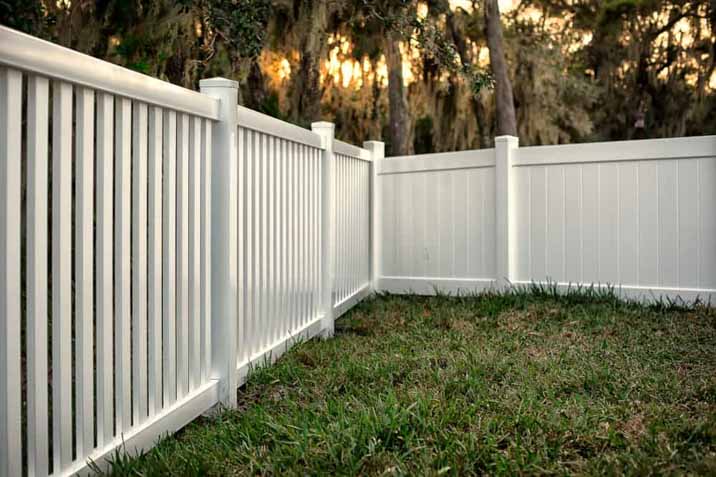
Vinyl is a type of manufactured material made from PVC plastics. Vinyl is also commonly used for flooring and weatherboard cladding as it has a superior durability, affordability, and maintenance requirements to many other traditional materials. Vinyl comes in many different designs, meaning that the homeowner can often choose exactly which finish, texture and colour they would prefer.
For the intermediate DIYer, a vinyl privacy fence is certainly a possibility as the installation is not as complicated as some materials. The cost of a vinyl fencing will usually land somewhere between $150-$200 per square metre. Vinyl is the perfect choice for poolside or patio privacy fencing as it is non-porous and water resistant.
4. Steel
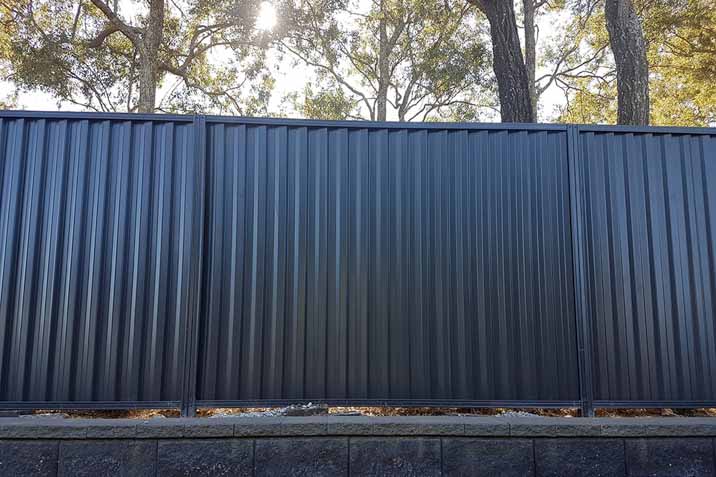
Steel is another material that is used for both cladding and fencing. Colorbond cladding in particular is a type of coated steel which is fortified against corrosion, chipping, peeling and cracking. Colorbond steel fences come in a huge variety of colours and finishes, such as white, matte black, glossy black, and even a natural steel look.
Steel fencing is water resistant and perfect for ensuring there are no gaps in your privacy screen. Steel fencing works equally well in all areas, whether it is the front fence, freestanding, or simply covering the pool deck / balcony from view.
3. Bamboo
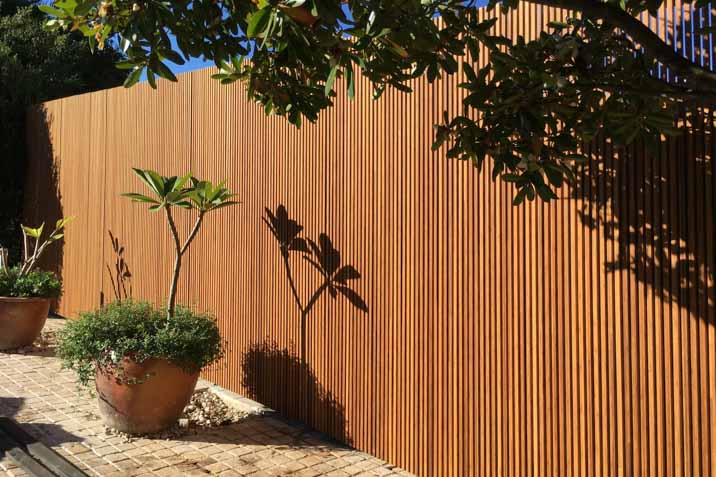
Bamboo is an environmentally friendly building material that has gained much traction in recent decades for its remarkable growth rate and undeniable aesthetic appeal. The regeneration rate of bamboo is extremely fast and farmed bamboo can actually grow up to a foot long in a day. This makes it an extremely attractive choice when compared with other materials that actively contribute to deforestation.
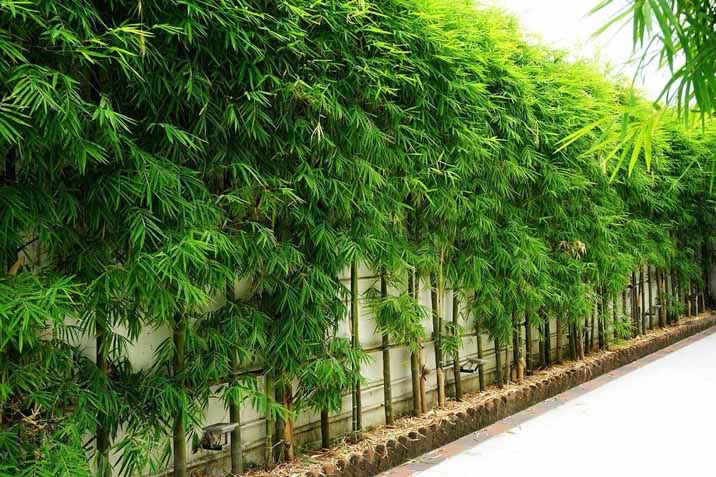
It is also a space efficient material to harvest, because it can be harvested multiple times (unlike trees). Bamboo is durable and strong. It is heat and water resistant, hypoallergenic, and – depending on where you live – fairly affordable. You can even make a fence from live bamboo, if you are up to the task of regular cutting and pruning.
2. Plants

Plants are one of the most attractive fence privacy screens you could possibly have. There are a variety of plants that are suited to the task of screening a home from prying eyes, so you can be sure that regardless of your climate or soil circumstances there will be a plant ready to thrive in your yard.
Plants chosen for privacy blur the line between garden and fence, allowing you to enjoy privacy without having to sacrifice aesthetic appeal or make your home feel unwelcoming. Popular plant choices for fence include bamboo, as above, boxwood, hicks yew, and cypress trees.
1. Timber
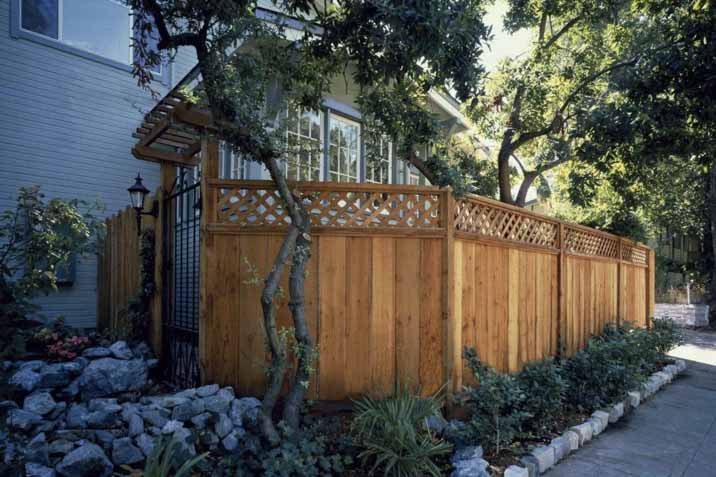
Timber is easily the most popular choice for privacy fencing currently on market. Timber is versatile and can be used in a variety of designs like panels, extensions, picket fencing, palling fencing (the best style for privacy) and more.
Furthermore, it comes in many different types and colours – each with their own properties. The best types of timber in Australia for privacy fences are Spotted gum, Ironbark, Sydney blue gum, Cedar, Redwood, White Mahogany and Tallow.

